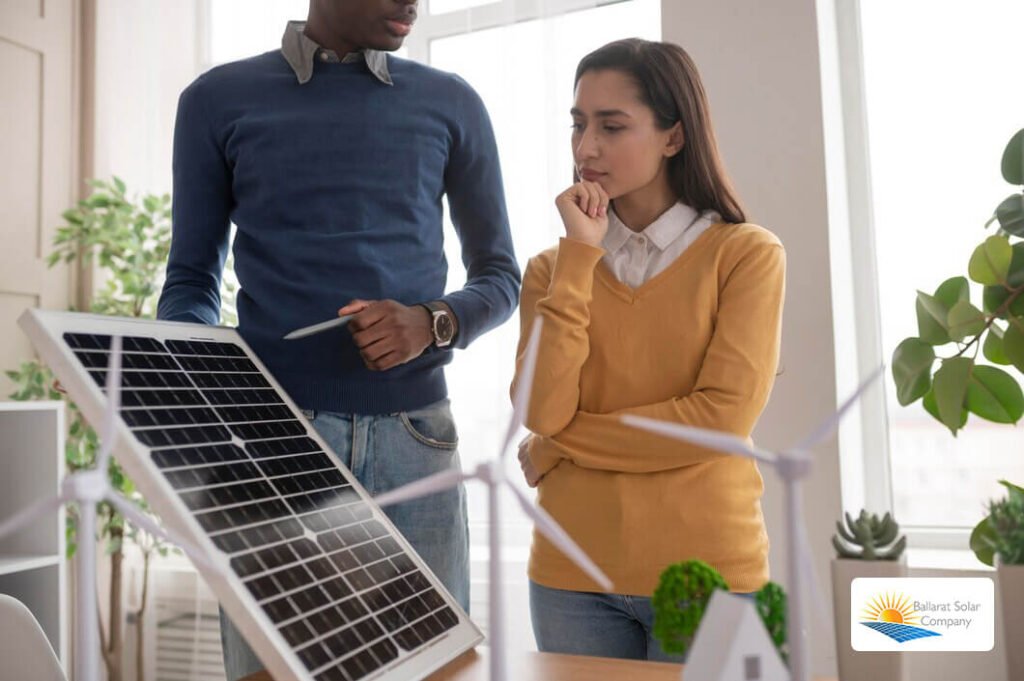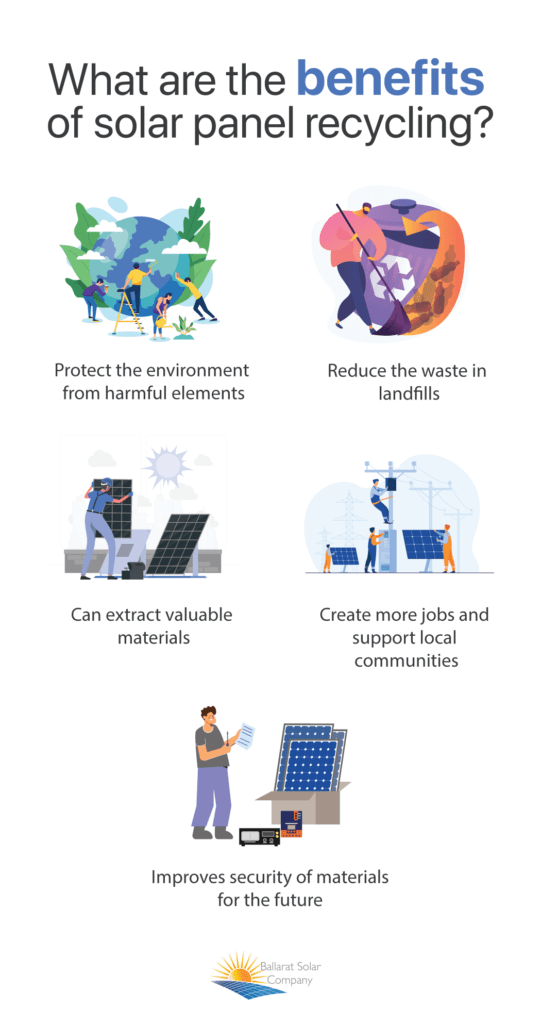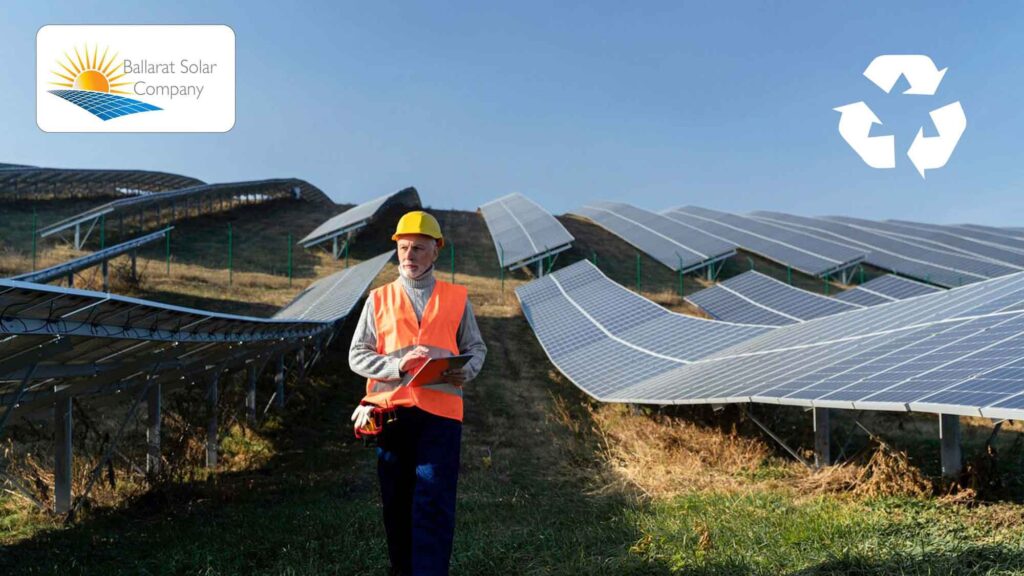Table of Contents
Solar panel recycling is becoming a key part of the sustainable energy movement in Australia. Not only does it help reduce waste, but it also ensures that precious materials from solar panels are put to good use.
The world is moving towards renewable energy sources that are not only more efficient but also more sustainable. As such, solar energy is becoming increasingly popular in Australia. Solar panels are becoming the norm in many households and businesses, but what happens when they reach the end of their life?
Can solar panels be recycled in Australia? In this article, we will explore the benefits of solar panel recycling in Australia and provide a guide to help you make the most of this green initiative.
What happens to solar panels at the end of their life?
Australia is on its way to making solar energy the most used renewable energy source throughout the country. As a result, the Federal and State Governments promote solar energy among households and businesses.
But what happens to solar panels at the end of their life? Like every other thing, solar panels also have their lifetime. As a result, Australia is currently facing a problem. What to do with the old solar panels?
It is illegal to dump solar waste into landfills in Australia. Especially since solar panels may contain hazardous materials such as lead and cadmium that could damage the ecosystem.
That’s why it is important to ensure that they are disposed of properly when solar panels reach the end of their life. Solar panel recycling is the best option for disposing when they reach the end of their lifetime. This ensures that the valuable materials are recycled and put to good use.
In some cases, it may be possible to repurpose old solar panels. For instance, you can use the materials from an old solar panel to create a new one. This is a great way to reduce waste and create something new out of something old.
How long do solar panels last?
Solar panels generally last for 25 to 30 years. However, after 25 years, the efficiency of solar panels will begin to reduce.
On the other hand, solar inverters would last for around 10-12 years as opposed to solar panels. There can be situations where you would have to dispose of these systems even before the respective lifespan.
For example, the new incentives and programs to promote solar energy in Australia motivate many households and businesses to buy new solar systems.
Are solar panels recyclable?
Can solar panels be recycled in Australia? The good news is that solar panels are indeed recyclable. In fact, most solar panels are made up of a variety of materials that can be recycled.
This includes metals such as aluminum, copper, steel, glass, plastic, and silicon. You can then use these materials to create new products and reduce the need for new materials.
However, it is important to note that some solar panels are not recyclable. For instance, thin-film solar cells are not typically recyclable as they are made up of various materials that cannot be separated.
In addition, some solar panels may contain hazardous materials such as lead and cadmium, which must be handled with care and disposed of properly.
How to recycle solar panels?

The process of recycling solar panels is relatively straightforward. First and foremost, ensuring that the solar panel you are looking to recycle does not contain any hazardous materials is important.
If it does, it is important to contact a professional waste disposal company (e-waste disposal company) to ensure the safe disposal of these materials. However, this is banned in Victoria. E-waste disposal is currently being discouraged in many states across Australia.
The next step you should take is to contact a solar panel recycling company. These companies will typically collect the solar panel and dismantle it.
The materials will then be sorted and recycled, with some companies even offering to purchase the recycled materials and provide a monetary incentive. Some of these companies have the expertise on how to make a solar panel out of recycled materials too.
It is important to note that not all solar panel recycling companies are the same. You should research the company you want to use to ensure they follow proper safety protocols and handle the materials responsibly.
Some of Australia’s popular solar panel recycling facilities are PV Industries, Reclaim PV, CMA Ecocycle, SolaCycle, and Ecoactiv.
What parts of solar panels can be recycled?
There are several solar recycling companies in Australia. However, Australian companies can only recycle up to 17% of a panel by weight.
The aluminum frame and plastic junction box are Australia’s most commonly recycled solar panel components.
Unfortunately, 83% of solar panel materials cannot be recycled in Australia. A large portion of solar panels is made out of glass. This recycled glass can be used for various purposes. However, you cannot currently recycle this glass in Australia. Likewise, polymer back sheeting cannot be recycled in Australia.
Other components in the solar system, such as inverters and batteries can be recycled in Australia. You can recycle the inverters through Australia’s existing e-waste recycling system.
In Victoria, you can take them to the e-waste drop-off point at council waste and recycling transfer stations. From there, they are sent to an e-waste recycler to extract and recycle valuable materials.
Read more: Sustainability Victoria
If you have ideas to tackle solar waste, take advantage of the $10m solar waste challenge. It is a program in Victoria to promote ideas to overcome solar waste.
What are the benefits of solar panel recycling?

There are various benefits of solar panel recycling. These benefits are:
- Protect the environment from harmful elements – Solar panels may contain harmful materials such as cadmium, arsenic, lead, etc. These heavy metals can easily damage the ecosystem if you dispose of these panels into the environment. Therefore solar panel recycling can help save the environment from heavy metals.
- Reduce the waste in landfills – Solar waste can easily fill up landfills. When you recycle panels and other solar materials, you can easily save up the landfills.
- Can extract valuable materials – There are various materials, including silicon and silver, in solar panels. You can extract these materials for future use.
- Create more jobs and support local communities – Solar panel recycling can create more jobs in the community. More people will get jobs in recycling plants.
- Improves security of materials for the future – When you recycle the panels, you can extract materials to use in the future. Therefore it can save new materials for the future.
The benefits of solar panel recycling are numerous. Not only does it reduce waste and conserve scarce resources, but it also helps create new jobs and industries.
Should you recycle your solar panels?
As a responsible citizen, it is your duty to handle solar waste properly. There are solar recycling plants all around Australia. Handover your waste solar panels to these plants. Sometimes, you might have to take these panels to the recycler by yourself. It can be costly, but it is one of the best solutions for solar waste.
If you don’t like to go through the trouble of recycling, then you can reuse the panels for other things. For example, solar panels can be used as a tabletop, as a fence, etc. Just make sure not to dispose of them in landfills.
Wrapping up
Solar panel recycling is a great way to reduce waste and conserve scarce resources. Not only does it help to create new jobs and industries, but it also helps to reduce energy costs.
By following this guide, you can make the most of solar panel recycling in Australia. Not only will you be helping to reduce waste and conserve precious resources, but you will also be contributing to a more sustainable future.
If you are looking for a socially responsible solar installer in Ballarat, don’t hesitate to contact Ballarat Solar Company. We have been in the industry for many decades, and we can help you to do your part as a responsible citizen.
So what are you waiting for? Start your solar panel recycling today!


